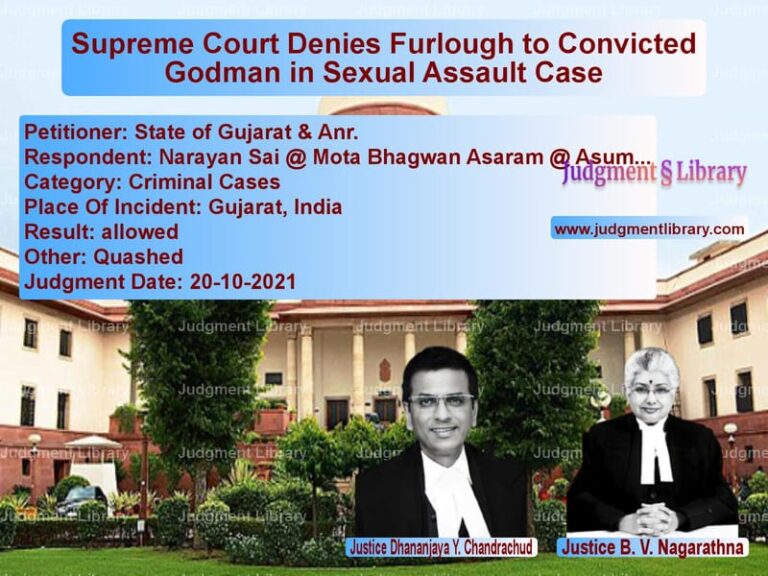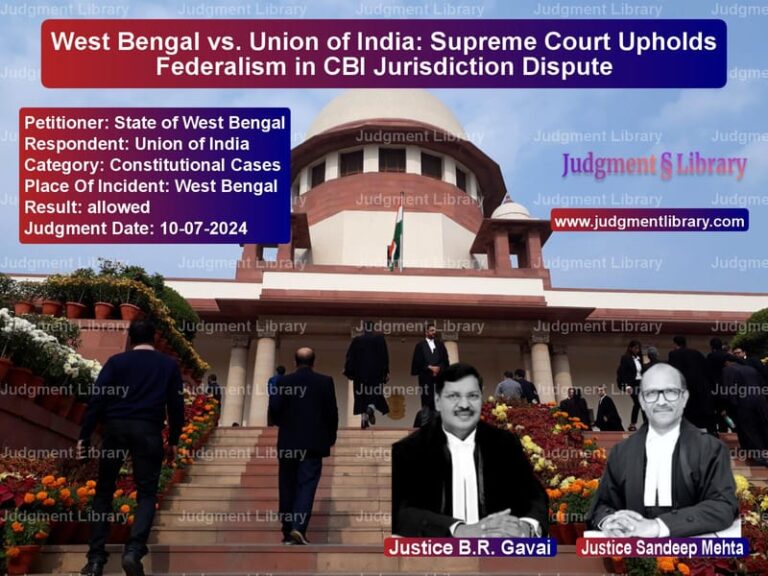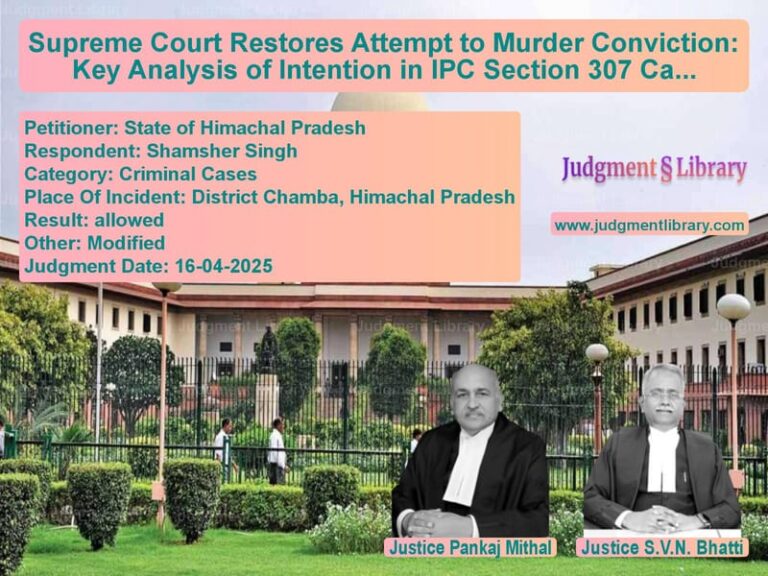Service Allocation Dispute After State Bifurcation: Supreme Court Directs Continuation of Service in Uttar Pradesh
The case of Arvind Kumar Gupta vs. Principal Secretary, Medical Health & Family Welfare Uttarakhand & Ors. addresses a significant issue concerning the allocation of services after the bifurcation of Uttar Pradesh under the Uttar Pradesh Re-Organisation Act, 2000. The appellant, a Drug Inspector, had been allocated to the newly formed state of Uttarakhand but sought to continue his service in Uttar Pradesh. This dispute brings to light the complexities of service allocation during state bifurcations and the consideration of personal and professional factors in such decisions.
The appellant’s grievance was that despite being officially allotted to Uttarakhand in 2007, he had been continuing in Uttar Pradesh due to personal reasons. The core issue that needed judicial resolution was whether the appellant could continue serving in Uttar Pradesh and retain his service benefits despite the official reallocation.
Background of the Case
In 2000, Uttar Pradesh was bifurcated into two states, Uttar Pradesh and Uttarakhand, as per the Uttar Pradesh Re-Organisation Act. Under the provisions of the Act, employees working in Uttar Pradesh were required to be reallocated between the two states based on their posting and eligibility. Arvind Kumar Gupta, at the time working as a Drug Inspector, was allotted to Uttarakhand after the bifurcation, as per the state’s requirements.
However, the appellant did not want to relocate to Uttarakhand for personal reasons and continued to serve in Uttar Pradesh. Over the years, he had remained in Uttar Pradesh, rendering uninterrupted service. The state of Uttar Pradesh had not raised any objections regarding his continued service in the state. Despite this, the appellant sought legal intervention to formalize his service allocation and ensure that he was not disturbed from his position in Uttar Pradesh.
Petitioners’ Arguments
The appellant, Arvind Kumar Gupta, represented by Senior Counsel, presented the following arguments:
- He was originally appointed as a Drug Inspector in Uttar Pradesh in 1999, and despite the bifurcation, he had continued to serve in the state without any objections.
- The personal reasons that kept him in Uttar Pradesh were legitimate, and considering his long uninterrupted service, it would be unreasonable to relocate him to Uttarakhand.
- The reallocation to Uttarakhand had been made administratively, and there was no formal decision that mandated his immediate transfer to Uttarakhand.
- He sought confirmation from the Court that his service in Uttar Pradesh should be treated as uninterrupted, and he should not be disturbed at this stage of his career.
Respondents’ Arguments
The respondents, represented by the State of Uttarakhand, put forth the following arguments:
- The appellant had been officially allocated to Uttarakhand following the bifurcation as per the provisions of the Uttar Pradesh Re-Organisation Act, 2000.
- Uttarakhand had specific requirements for staff allocation, and the appellant’s continued service in Uttar Pradesh was outside the prescribed allocation.
- The reallocation process was lawful, and while personal preferences of the appellant were understood, administrative allocations had to be followed.
- It was necessary for the appellant to be officially moved to Uttarakhand as per the legal framework governing employee allocations in post-bifurcation states.
Supreme Court’s Observations and Judgment
The Supreme Court, in a judgment delivered by Justice Kurian Joseph, took into account the appellant’s long and uninterrupted service in Uttar Pradesh and the absence of any objections raised by the state authorities. The Court ruled as follows:
- “Having considered the facts of the case, we are of the view that, considering the long and uninterrupted service rendered by the appellant in the State of Uttar Pradesh, he should not be disturbed.”
- The appellant had been working in Uttar Pradesh since 1999, and the bifurcation in 2000 did not change the essence of his service commitment to the state.
- The Court observed that, given the appellant’s long service and the absence of any adverse effect on the functioning of Uttarakhand’s medical health department, it was in the interest of justice to allow the appellant to continue in Uttar Pradesh.
- The appellant was to be treated as an employee of Uttar Pradesh, as per his original allocation in 1999, and no further relocation would be necessary.
- The Supreme Court concluded by directing the relevant authorities to ensure that the appellant’s benefits, including pension and gratuity, be preserved as per his initial appointment and service in Uttar Pradesh.
Key Legal Takeaways
The ruling establishes several important legal principles regarding state bifurcation and service allocation:
- Long Service Consideration: Long and uninterrupted service in a particular state cannot be disregarded merely due to administrative reallocation after a state bifurcation.
- Jurisdictional Flexibility: In cases where the service of an employee does not disrupt administrative functioning, courts can exercise flexibility in allowing employees to continue in their original state.
- Government Employees’ Rights Post-Bifurcation: Employees allocated to a new state after bifurcation may request to remain in their original state, and their long service history should be a decisive factor in such requests.
- Respect for Employees’ Personal Grounds: Personal circumstances, provided they do not hinder official duties, may be taken into account when considering state reallocation decisions.
Impact of the Judgment
The Supreme Court’s ruling has far-reaching implications for government employees in post-bifurcation scenarios:
- The ruling reaffirms that personal circumstances, alongside uninterrupted service, can be a strong ground for employees to continue working in their original state post-bifurcation.
- It provides clarity for government employees about their rights in situations where state boundaries change, ensuring that they are not unfairly displaced due to administrative decisions.
- The judgment highlights the importance of preserving employees’ rights, including pension and gratuity, when they have been allocated to another state but wish to continue in their original location.
Conclusion
The Supreme Court’s decision in Arvind Kumar Gupta vs. Principal Secretary, Medical Health & Family Welfare Uttarakhand & Ors. provides a landmark ruling on the issue of service allocation post-state bifurcation. By allowing the appellant to remain in Uttar Pradesh despite official reallocation, the Court recognized the importance of long-term service and personal circumstances in determining the appropriate jurisdiction for government employees.
This judgment serves as an important precedent for similar cases in the future, ensuring that the legal framework surrounding employee relocation remains just and considers the broader picture of an individual’s service history and personal grounds.
Don’t miss out on the full details! Download the complete judgment in PDF format below and gain valuable insights instantly!
Download Judgment: Arvind Kumar Gupta vs Principal Secretary, Supreme Court of India Judgment Dated 20-07-2017.pdf
Direct Downlaod Judgment: Direct downlaod this Judgment
See all petitions in Employment Disputes
See all petitions in Transfers Cases
See all petitions in Public Sector Employees
See all petitions in Judgment by Kurian Joseph
See all petitions in Judgment by R. Banumathi
See all petitions in allowed
See all petitions in supreme court of India judgments July 2017
See all petitions in 2017 judgments
See all posts in Service Matters Category
See all allowed petitions in Service Matters Category
See all Dismissed petitions in Service Matters Category
See all partially allowed petitions in Service Matters Category







